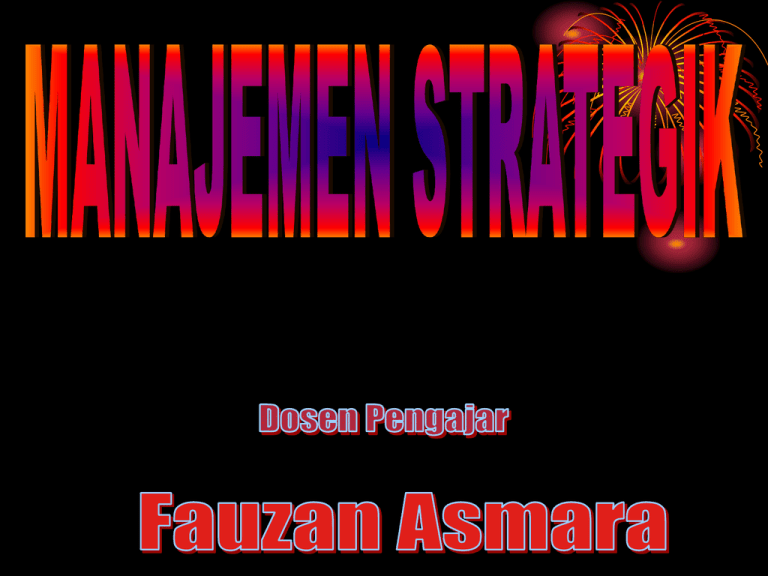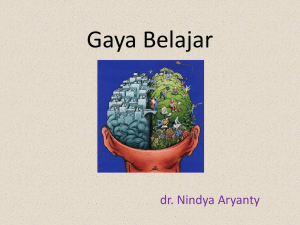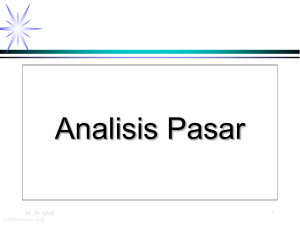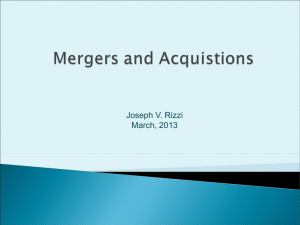Man. Strategic Full
advertisement

Buku-buku Manajemen Strategik 1. 2. 3. 4. 5. 6. 7. Strategic Management, Pearce & Robinson Strategic Management, Hill & Jones Strategic Management, A. Hitt ; ireland; Hoskisson Managing the Strategy Process, Cakravarthy Concept of Strategic Management, Fred R. David Strategic Management, Arnold C. Hax Strategic Management, Concept and Casas, Arthur Thompson 8. Manajemen Strategik, Suwarsono The Nature and Value of Strategic Management (Hakekat dan Manfaat Manajemen Strategik) Strategic Management Basic Financial Management - to meet the budget, Forecast based planning – predict the future, Externally oriented planning – think strategically, Strategic management – create the future. Strategic Management Is defined as the set of decisions and actions that result in the formulation and implementation of strategic designed to achieve a company’s objectives Dimensi- dimensi Keputusan Strategik • • • • • • Membutuhkan keputusan manajemen puncak. Membutuhkan alokasi sumber daya perusahaan dalam skala besar. Mempengaruhi kesejahteraan perush dalam jangka panjang Berorientasi kemasa depan Mempunyai konsekuensi multifungsional/ multibisnis Harus mempertimbangkan lingkungan eksternal 3 Tingkatan Manajemen Strategik Corporate Level (Dewan Direksi, Presdir) - Merumuskan visi dan misi perusahaan - Analisis internal dan eksternal - Analisis pilihan-pilihan strategik Business Level (Direktur, Direks, GM) - Menyusun rencana jangka panjang - Merumuskan Grand Strategy Functional Level (Manager) - Menyusun rencana jangka pendek - Merumuskan strategi fungsional dan implementasi Manfaat Manajemen Strategik Memperkuat kemampuan perusahaan mencegah masalah Formulasi keputusan berdasarkan kelompok menghasilkan pilihan strategi terbaik Mempertinggi motivasi SDM Mengurangi tumpang tindih kegiatan Penolakan terhadap perubahan berkurang Strategic Management Model COMPANY MISSION COMPANY PROFILE What is Posible External Enviraonment Operting Industry And Multinational Analysis What is Desired? Feed Back Feed Back Strategic Analysis and Choice Long – Term objectives Annual Objectives Legend: Major Impact Minor Impact Grand Strategies Functional Strataegies Institutionalizing the Strategies Control and Evaluation Policies COMPONENT OF THE MANAGEMENT MODEL 1. 2. 3. 4. 5. 6. 7. 8. 9. 10. 11. Company mission (misi perusahaan) Company profile (profil perusahaan) External environment (lingkungan eksternal) Strategic analysis and choice (analisis dan pilihan strategik) Long-term objectives (sasaran jangka panjang) Grand strategy (strategi umum) Annual objectives (sasaran tahunan) Functional strategies (strategi fungsional) Policies (kebijakan) Institutionalizing the strategy (melembagakan strategi) Control and evaluation (pengendalian dan evaluasi) 3 (tiga) Bentuk Proses Berpikir Berpikir sistem mekanik intuisi Berpikir strategik Bentuk masalah Proses Berpikir pemecahan Penyusunan kembali elemen- elemen Optimalisasi lokal atau melihat pohon tidak hutannya Perubahan atau pergantian bentuk How The Process of Strategic Decision have been made? Copyright 2006, Fauzan Asmara & Associates, Inc. Karunia Allah Kepada Manusia Sebagai Khalifah di muka bumi Copyright, 2006, Fauzan Asmara & Associates, Inc. NEURONS Pyotr Anokhin Manusia memiliki ratusan milyar neuron. Kepandaian tidak ditentukan volume otak, tetapi ditentukan oleh INTERCONECTION antar neuron atau CIRCUIT. Copyright, 2006, Fauzan Asmara & Associates, Inc. Neuron berkembang sejak bayi dalam kandungan Setelah lahir berada pada tahap pematangan Exposure stimulus perlu dirancang sejak dini Orang pintar : interconection otak rapat, banyak dan jauh. Orang bodoh: interconection otak renggang, jarang dan pendek. Otak harus mengkonsumsi banyak ilmu agar sehat, awet dan bugar. Copyright, 2005, Fauzan Asmara & Associates, Inc. 4 LANGKAH MEMBACA untuk MEMICU DAYA KREATIF (JORDAN AYAN) • BERJANJILAH untuk MEMBACA secara KREATIF SETIAP HARI • MEMBACA secara “NGEMIL” (sedikit demi sedikit) • BACALAH SESUATU dari BERAGAM SUMBER BACAAN • TERAPKAN APA yang ANDA BACA dalam KEHIDUPAN SEHARI-HARI Pengaruh IQ hanya 5 - 20% Sisanya dipengaruhi oleh EQ dan SQ Copyright 2006, Fauzan Asmara & Associates, Inc. Brain Mapping Neocortex Otak berfikir dan berbahasa (alam sadar) Limbic Pusat emosi Amigdala Copyright, 2006, Fauzan Asmara & Associates, Inc. Gudang ingatan emosional Pengendali alam sadar Kabel pemicu syaraf Alam Bawah Sadar menjalankan super program, menghasilkan out-put : •Sukses Bisnis •Citra Diri dan Perusahaan •Nasib Perusahaan Copyright, 2006, Fauzan Asmara & Associates, Inc. Gelombang Otak Copyright 2006, Fauzan Asmara & Associates, Inc. Hemisphere of Human Brain KINERJA PUNCAK OTAK Copyright, 2006, Fauzan Asmara & Associates, Inc. BAGAIMANA MENGAKTIFKAN ALFA •MUSIC •ARTISTIC •PANORAMIC PICTURE •RELIGIOUS RITUAL •GOOD ATMOSPHERE •JOKE & FUN •LOVE Copyright, 2006, Fauzan Asmara & Associates, Inc. Energy and Emotion Robert E. Thayer (California State University) • Tense – Energy • Calm – Energy • Tense – Tiredness • Calm - Tiredness C = Calmness; E = Energy; T = Tension; F = Fatigue Spiritual Quotient Kemampuan memberi makna puncak spiritual (ultimate meaning) bersumber dari suara hati ilahiah (fitrah) dan menjadikan Tuhan sebagai pusat orbit dan kita senantiasa berada di garis orbit- Nya. Spiritual Experience (Pare-line) Osilasi 40 Herz Copyright, 2005, Fauzan Asmara & Associates, Inc. SUARA HATI ILAHIAH dari Pusat Orbit Pengasih sesama Berhati jernih Menguasai diri Cinta Damai Kejujuran Kreatif Pemaaf Murah hati Empati Objektif Berilmu Adil Mensyukuri Bersikap mulia Berhati lapang Kebenaran Komitmen Konsisten Mandiri Inovatif Bersikap terpuji Memiliki skill Enerjik Selalu Menghargai Sinergis Ikhlas Pemberi manfaat Inspirator Estetis Pendelegasi Sabar Dan (ingatlah) ketika Tuhanmu mengeluarkan dari bani Adam keturunannya dari sulbinya, dan Allah mengambil kesaksian terhadap jiwa mereka (seraya berkata): “Bukankah Aku ini Tuhanmu?”. Mereka menjawab: “Betul (Engkau Tuhan kami) kami bersaksi.” Al- A’raaf 172 Copyright, 2005, Fauzan Asmara & Associates, Inc. Rumus ZMP Bangkitkan “Raksasa tidur” dalam diri Anda 1/0 = ~ Jika Anda ikhlas dan jernih (=0) maka Anda akan mendekati yang Maha Tak Terhingga yaitu Tuhan Bersihkan diri Anda dari Belenggu (Zero Mind Process) Copyright, 2006, Fauzan Asmara & Associates, Inc. ESQ Processing System Orientasi Materialisme Orientasi Spiritualisme Emosi tdk terkendali Emosi terkendali Marah, sedih, cemas Tenang, damai, ikhlas God Spot terbelenggu God Spot terbuka Suara hati tertutup Suara hati bekerja Logika tdk bekerja normal Logika bekerja normal IQ, EQ, SQ terpisah Split personality IQ, EQ, SQ terintegrasi Personality Balance 4 tipe Manusia Copyright, 2006, Fauzan Asmara & Associates, Inc. Management Strategic Comprehensive Strategic Model The External Environment: Opportunities, Threats, Industry Competition, and Competitor Analysis Internal Analysis/Company Profile Fauzan Asmara Ch2-32 Strategic Management Model COMPANY MISSION COMPANY PROFILE What is Possible External Environment Operating Industry And Multinational Analysis What is Desired? Feed Back Feed Back Strategic Analysis and Choice Long – Term objectives Annual Objectives Legend: Major Impact Minor Impact Grand Strategies Functional Strategies Institutionalizing the Strategies Control and Evaluation Policies The External Environment: Opportunities, Threats, Industry Competition, and Competitor Analysis Michael A. Hitt R. Duane Ireland Robert E. Hoskisson Ch2-34 Components of the General Environment Economic Demographic Sociocultural Industry Environment Competitive Environment Political/L egal Global Technological Ch2-35 Components of the General Environment Demographic Segment Population size Age structure Geographic distribution Ethnic mix Income distribution Economic Segment Personal savings rate Business savings rates Gross domestic product Political/Legal Segment Antitrust laws Taxation laws Deregulation philosophies Labor training laws Educational philosophies and policies Sociocultural Segment Women in the workforce Workforce diversity Attitudes about work life quality Concerns about the environment Shifts in work and career preferences Shifts in preferences regarding product and service characteristics Technological Segment Product innovations Applications of knowledge Focus of private and government-supported R&D expenditures New communication technologies Global Segment Important political events Critical global markets Newly industrialized countries Different cultural and institutional attributes Inflation rates Interest rates Trade deficits or surpluses Budget deficits or surpluses Ch2-36 External Environmental Analysis Scanning Identifying early signals of environmental changes and trends Monitoring Detecting meaning through ongoing observations of environmental changes and trends Forecasting Developing projections of anticipated outcomes based on monitored changes and trends Assessing Determining the timing and importance of environmental changes and trends for firms' strategies and their management Ch2-37 Porter’s Five Forces Model of Competition Threat of Threat Newof New Entrants Entrants Bargaining Power of Suppliers Rivalry Among Competing Firms in Industry Bargaining Power of Buyers Threat of Substitute Products Ch2-38 Competitor Analysis Identifying the company’s competitor Assessing competitors’ objectives, strategies, strengths, and weaknesses, and reaction patterns Selecting which competitors to attack or avoid The Internal Environment: Resources, Capabilities and Core Competencies Michael A. Hitt R. Duane Ireland Robert E. Hoskisson ©2000 South-Western College Publishing Ch2-40 External Environment What the Firm Might Do? Sustainable Competitive Advantage Internal Environment What the Firm Can Do? Ch2-41 SWOT Analysis • • • • Strengths Weaknesses Opportunities Threats Ch2-42 The purpose of SWOT Analysis • It is an easy-to-use tool for developing an overview of a company’s strategic situation – It forms a basis for matching your company’s strategy to its situation Ch2-43 Strengths • A STRENGTH is something a company is good at doing or a characteristic that gives it an important capability. • Possible Strengths: – Name recognition – Proprietary technology – Cost advantages – Skilled employees – Loyal Customers Ch2-44 Weaknesses • A WEAKNESS is something a company lacks or does poorly (in comparison to others) or a condition that places it at a disadvantage • Possible Weaknesses: – Poor market image – Obsolete facilities – Internal operating problems – Poor marketing skills Ch2-45 Strengths and Weakness form a basis for INTERNAL analysis • By examining strengths, you can discover untapped potential or identify distinct competencies that helped you succeed in the past. • By examining weaknesses, you can identify gaps in performance, vulnerabilities, and erroneous assumptions about existing strategies. Ch2-46 Discovering Core Competencies Competitive Advantage Gained through Core Competencies Strategic Competitiveness Discovering Core Competencies Core Competencies Above-Average Returns Sources of Competitive Advantage Capabilities Criteria of Sustainable Advantages Teams of Resources Resources * Tangible * Intangible * * * * Valuable Rare Costly to Imitate Nonsubstitutable Ch2-47 Core Competencies What a firm Does... Core Competencies must be: that is Strategically Valuable Valuable Capabilities that either help a firm to exploit opportunities to create value for customers or to neutralize threats in the environment Rare Capabilities that are possessed by few, if any, current or potential competitors Costly to Imitate Capabilities that other firms cannot develop easily, usually due to unique historical conditions, causal ambiguity or social complexity Nonsubstitutable Capabilities that do not have strategic equivalents, such as firm-specific knowledge or trust-based relationships Ch2-48 Key Issues of Business-Level Strategy ►What good or service to offer customers ►How to manufacture or create the good or service ►How to distribute the good or service in the marketplace The Central Role of Customers In selecting a business-level strategy, the firm determines 1. who it will serve? 2. what needs those target customers have that it will satisfy? 3. how those needs will be satisfied ? Quality Dimensions of Goods & Services Product Quality Dimensions: Performance Features Flexibility Durability Operating characteristics Important special characteristics Meeting operating specifications over time Amount of use before performance deteriorates Conformance Match with pre-established standards Serviceability Ease and speed of repair or normal service Aesthetics How a product looks and feels Perceived quality Subjective assessment of characteristics (product image) Quality Dimensions of Goods & Services Service Quality Dimensions: Timeliness Performed in promised period of time Courtesy Performed cheerfully Consistency Giving all customers similar experiences Convenience Accessibility to customers Completeness Fully serviced, as required Accuracy Performed correctly each time Strategies in Action Long-Term Objectives Grand Strategies Strategy Implementation Fauzan Asmara Ch. 5-53 Strategies in Action Nature of Long-Term Objectives (Results expected from pursuing certain strategies; time line 2 to 5 years) Quantitative Measurable Realistic Understandable Challenging Hierarchical Obtainable Congruent among organizational units Ch. 5-54 © 2001 Prentice Hall Strategies in Action Nature of Long-Term Objectives Objectives are associated with a time line and stated in terms: • Growth in assets • Growth in sales • Profitability • Market share • HRD • Increasing Capability • Social responsibility Ch. 5-55 © 2001 Prentice Hall Strategies in Action Nature of Long-Term Objectives Objectives are the basis for: • • • • • Designing jobs Organizing activities Providing direction Organizational synergy Standards for evaluation Ch. 5-56 © 2001 Prentice Hall Grand Strategies Vertical Integration Strategies • • • Forward integration Backward integration Horizontal integration Ch. 5-57 © 2001 Prentice Hall Grand Strategies Forward Integration Example Defined • • General Motors mengakuisisi 10 persen saham dealer Memperoleh kepemilikan atau meningkatkan kendali atas distributor atau dealer Ch. 5-58 © 2001 Prentice Hall Grand Strategies Backward Integration Example • Defined • Hotel membeli perusahaan biro perjalanan; mebel;etc. Mendapatkan kepemilikian atau meningkatkan kendali atas pemasok Ch. 5-60 © 2001 Prentice Hall Grand Strategies Horizontal Integration Example • Defined • Mendapatkan kepemilikan atau mengambil alih perusahaan pesaing Hotel Hilton membeli Hotel Promus Ch. 5-62 © 2001 Prentice Hall Grand Strategies Intensive Strategies • • • Market penetration Market development Product development Ch. 5-64 © 2001 Prentice Hall Grand Strategies Market Penetration Example • Defined Unilever membelanjakan uang untuk iklan TV sebesar 1.2 Trilyun sepanjang tahun 2005 Meningkatkan pangsa pasar dengan produk dan jasa yang ada pada pasar yang ada dengan usaha-usaha pemasaran Ch. 5-65 © 2001 Prentice Hall Grand Strategies Market Development Example Defined • • Memperkenalkan produk atau jasa yang ada pada daerah atau pasar baru Fren pemain seluler CDMA sekarang mulai merambah ke Makasar dan palembang setelah Jawa, Madura dan Bali Ch. 5-67 © 2001 Prentice Hall Grand Strategies Product Development Example Defined • Merubah atau memodifikasi produk perusahaan dan dijual pada pasar yang sudah ada • Apel mengembangkan Chip G4 yang memiliki kecepatan 500 megahertz. Ch. 5-69 © 2001 Prentice Hall Grand Strategies Diversification Strategies Concentric diversification • Conglomerate diversification • Ch. 5-71 © 2001 Prentice Hall Grand Strategies Concentric Diversification Example Defined • • Menambah produk atau jasa baru, yang masih berkaitan (pasar, produk, dan teknologi) Sebuah bank membeli perusahaan asuransi. Ch. 5-72 © 2001 Prentice Hall Grand Strategies Conglomerate Diversification Example Defined • • Menambah produk atau jasa baru yang tidak PT. Sampoerna mulai melirik bisnis properti untuk kelangsungan hidup grup sampoerna berkaitan Ch. 5-74 © 2001 Prentice Hall Grand Strategies Defensive Strategies • • Joint venture Retrenchment • Divestiture • Liquidation Ch. 5-76 © 2001 Prentice Hall Grand Strategies Joint Venture Example Defined Dua atau lebih perusahaan mensposnori untuk membentuk perusahaan baru terpisah dengan tujuan • • Lucent Technologies and Philips Electronic NV formed Philips Consumer Communications to make and sell telephones. yang sama Ch. 5-77 © 2001 Prentice Hall Grand Strategies Retrenchment Turn Around Example Defined • Mengubah pengelompokan melalui pengurangan biaya dan aset untuk memperbaiki penjualan dan laba yang • Perusahaan Perkebunan Negara merampingkan organisasi; melakukan rasionalisasi; pengurangan perjalanan dinas dan fasilitas mewah untuk menekan kerugian. menurun. Ch. 5-79 © 2001 Prentice Hall Grand Strategies Divestiture Example Defined • • Selling a division or part of an organization Harcourt General, the large US publisher, is selling its Neiman Marcus division. Ch. 5-81 © 2001 Prentice Hall Grand Strategies Liquidation Example Defined • • Selling all of a company’s assets, in parts, for their Bank Summa menjual seluruh asetnya untuk menutup kewajibannya tangible worth Ch. 5-83 © 2001 Prentice Hall Contoh Soal Toyota mendirikan AUTO 2000 untuk mendukung penjualan dan jaringan service di seluruh Indonesia. Indofood mengakuisisi PT. Bogasari untuk menjamin kelancaran pasokan gandumnya. SCTV mendirikan ScFm di Surabaya. Kartu kredit city Bank yang tadinya dijual ke pengusaha sekarang juga merambah ke kalangan mahasiswa. Indofood yang sudah memiliki produk Indomie akhirnya juga mengakuisisi Sarimie dan Supermie Michael Porter’s Generic Strategies Cost Leadership Strategies Differentiation Strategies Focus Strategies Ch. 5-86 © 2001 Prentice Hall Five Generic Strategies Competitive Advantage Cost Uniqueness Broad target Differentiation Integrated Cost Leadership/ Differentiation Narrow target Competitive Scope Cost Leadership Focused Cost Leadership Focused Differentiation Ch. 5-87 © 2001 Prentice Hall


